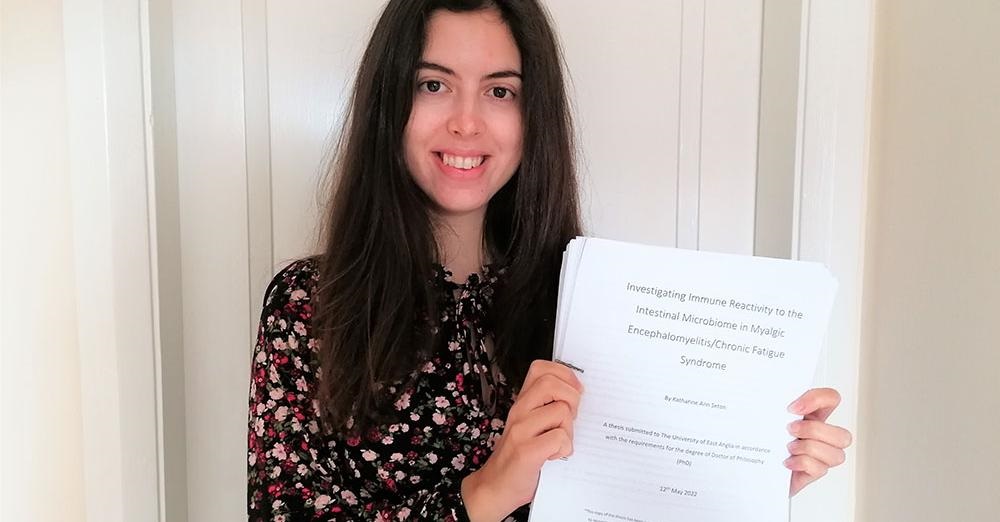On the 12th May 2022 I submitted my PhD thesis entitled “Investigating Immune Reactivity to the Intestinal Microbiome in Myalgic Encephalomyelitis/Chronic Fatigue Syndrome”.
On the 30th August 2022 I successfully defended my thesis during my viva.
My PhD was jointly funded by Invest in ME Research and the University of East Anglia (UEA).
I would like to say a big thank you to everyone who donated to Invest in ME Research to fund this PhD project.My PhD project utilised samples donated from participants enrolled onto the Health Research Authority (HRA) approved human study “Defining autoimmune aspects of Myalgic Encephalomyelitis/Chronic Fatigue Syndrome (ME/CFS)” undertaken by the Quadram Institute Bioscience.
This human study recruited five pairs of severe (house- or bed-bound) ME/CFS patients and matched household controls (healthy volunteers living with or caring for ME/CFS patients).
Participants were recruited through the ME/CFS team at East Coast Community Healthcare Centre and the Epsom and St Helier CFS service.Each participant donated a faeces sample and blood sample to the study during home visits – which were carried out to ensure the impact of study involvement on housebound patients’ health was minimised.
We are extremely grateful to all study participants without whom this research project would not have been possible.The purpose of this human study was to find out whether gut disturbances contribute to inflammation and autoimmunity seen in ME/CFS patients.
ME/CFS patients have previously been found to have a ‘leaky gut’.
Usually the gut wall separates gut microbes from internal organs and the bloodstream.
When this barrier becomes leaky gut microbes can enter the bloodstream and trigger systemic (whole body) inflammation.
Inflammation can rewire the immune system to attack the human body and cause autoimmune diseases.The study findings were different to what was expected.
Instead it was found that severe ME/CFS patients have a weakened systemic immune response against gut microbes.
A weakened immune response against gut microbes could result in the failure to clear microbes which have leaked from the gut into the bloodstream and internal organs.
This weakened immune response could be a result of the immune system “burning out” or “ageing prematurely” following the initial ME/CFS trigger.
The findings from this pilot study highlight the need for further research into why the immune response to gut microbes is weakened and what contribution this has to symptom presentation and severity.Results from this PhD project are currently being written up into a manuscript for publication in a peer-reviewed journal.

Dr Katharine Seton - Quadram Institute, Norwich
Research Blog
Research News from Katharine Seton
“Investigating Immune Reactivity to the Intestinal Microbiome in Myalgic Encephalomyelitis/Chronic Fatigue Syndrome”
Completion of the 4th Invest in ME Research funded PhD
Posted by:
Post Date:
October 2022


